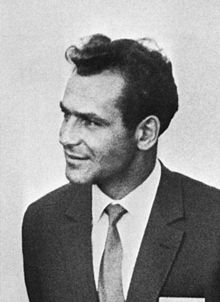Gherman Stepanovich Titov
| Gherman Titov | |
|---|---|

|
|
| Cosmonaut | |
| Nationality | Russian |
| Born | Gherman Stepanovich Titov 11 September 1935 Verkhneye Zhilino, West Siberian Krai, Russian SFSR, Soviet Union |
| Died | 20 September 2000 (aged 65) Moscow, Russia |
|
Resting place
|
Novodevichy Cemetery, Moscow |
|
Other occupation
|
Pilot |
| Rank | General-Colonel, Soviet Air Force |
|
Time in space
|
1d 01h 18m |
| Selection | Air Force Group 1 |
| Missions | Vostok 2 |
| Awards |
|
Gherman Stepanovich Titov (Russian: Герман Степанович Титов; 11 September 1935 – 20 September 2000) was a Soviet cosmonaut who, on 6 August 1961, became the second human to orbit the Earth, aboard Vostok 2, preceded by Yuri Gagarin on Vostok 1. He was the fourth person in space, counting suborbital voyages of US astronauts Alan Shepard and Gus Grissom.
Titov's flight finally proved that humans could live and work in space. He was the first person to orbit the Earth multiple times (a total of 17), to spend more than a day in space, to sleep in orbit and to suffer from space sickness. In fact, he also holds the record for being the first person to vomit in space. He was the first to pilot a spaceship personally and he made the first manual photographs from orbit, thus setting a record for modern space photography. He also was the first person to film the Earth using, for ten minutes, a professional quality Konvas-Avtomat movie camera. A month short of 26 years old at launch, he remains the youngest person to fly in space.
In his subsequent life Titov continued to work for the Soviet space program, playing a major role in the Spiral project where he trained to become the first pilot of an orbital spaceplane. However, after the death of Yuri Gagarin in a military aircraft accident in 1968 the Soviet government decided it couldn't afford to lose its second cosmonaut, and so Titov's career as test pilot ended.
Titov served in the Soviet Air Force and become a colonel-general, and in his final years in post-Soviet Russia he became a Communist politician. Despite having been chosen only second after Gagarin to fly into space, it was Titov who later proposed the Soviet Government regularly celebrate Cosmonautics Day on April 12, the day of Gagarin's flight.
...
Wikipedia

